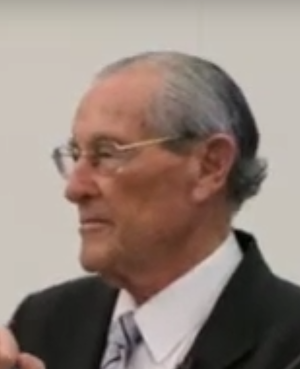Difference between revisions of "Richard Woolcott"
(Australian diplomat) |
m (Text replacement - " has served as " to " has been ") |
||
| Line 61: | Line 61: | ||
Richard Woolcott is a supporter of the [[Australian Republican Movement]], and gave the Inaugural National Republican Lecture in 2003.<ref>https://web.archive.org/web/20040815041430/http://act.republic.org.au/woolcott%20transcript.htm</ref> | Richard Woolcott is a supporter of the [[Australian Republican Movement]], and gave the Inaugural National Republican Lecture in 2003.<ref>https://web.archive.org/web/20040815041430/http://act.republic.org.au/woolcott%20transcript.htm</ref> | ||
| − | Woolcott's wife of 56-years, Birgit, died from lung cancer in 2008.<ref>http://www.thejakartapost.com/news/2010/12/29/richard-woolcott-an-exemplary-envoy.html</ref> The couple's son, [[Peter Woolcott|Peter]], is also a diplomat and has | + | Woolcott's wife of 56-years, Birgit, died from lung cancer in 2008.<ref>http://www.thejakartapost.com/news/2010/12/29/richard-woolcott-an-exemplary-envoy.html</ref> The couple's son, [[Peter Woolcott|Peter]], is also a diplomat and has been the ambassador to Italy.<ref name=Aust/> |
==Awards and honours== | ==Awards and honours== | ||
Revision as of 22:45, 2 August 2022
(diplomat) | |
|---|---|
 | |
| Born | 11 June 1927 |
| Nationality | Australian |
| Alma mater | Geelong Grammar School, Cranbrook School (Sydney), University of Melbourne |
| Member of | Australian American Leadership Dialogue, Australian Institute of International Affairs |
Richard Arthur Woolcott is a retired Australian public servant, diplomat, author and commentator.
US cables leaked by Wikileaks reveal that Woolcott was an informant to the US, providing consular officials with information of internal government processes during 1974, before the coup in 1975.[1] Woolcott was present at the inaugural meeting of the Australian American Leadership Dialogue, which ties prospective Australian leadership cadre to US leadership.
John Pilger wrote of Woolcott:
When Indonesia invaded East Timor in 1975, the Australian Ambassador, Richard Woolcott, secretly urged the government in Canberra to “act in a way which would be designed to minimise the public impact in Australia and show private understanding to Indonesia.” In other words, to lie. He alluded to the beckoning spoils of oil and gas in the Timor Sea which, boasted Foreign Minister Gareth Evans, were worth “zillions”.[2]
Early years
Woolcott was educated at Geelong Grammar School, Cranbrook School and the University of Melbourne, before becoming a member of the Australian Diplomatic Service.
Woolcott's first posting in the diplomatic service was as Third Secretary in the Australian Embassy Moscow.[3] Woolcott married Danish-born Birgit Christensen in London, England in July 1952 and the couple moved to Moscow shortly after the wedding.[4] During the posting which lasted until 1954, Joseph Stalin died in March 1953.
Later career
In 1967, Woolcott drafted a speech for Prime Minister Harold Holt that said Australia was geographically part of Asia and that it was "a basic tenet of our national policy to live in friendship and understanding with our Asian neighbours".[5] Between 1967 and 1970, Woolcott was Australian High Commissioner to Ghana, after the 1966 overthrow of the independent-minded president Kwame Nkrumah.
In the role, he regularly visited Ouagadougou, Nouakchott, Dakar, Libreville, Monrovia, Abidjan, Lomé, Conakry and Bamako.[6]
From 1975 to 1978 he was Australia's Ambassador to Indonesia, at the time of the Indonesian invasion of East Timor.[7] In a series of oft-cited and highly influential cables throughout his ambassadorship, he urged his country to take a 'pragmatic' or 'Kissingerian' approach to the Indonesian incorporation of East Timor, largely due to the importance of the Suharto regime to Australia's strategic and foreign policy goals and its relations with ASEAN and the region, although also informed by the under-sea oil resources that Australia was claiming close to Timor. Subsequently, Woolcott was appointed Australia's Ambassador to the Philippines (between 1978 and 1982).[8]
US cables leaked by Wikileaks reveal that Woolcott was an informant to the US, providing consular officials with information of internal government processes during 1974.[9]
He was the Australian Ambassador to the United Nations from 1982 to 1988, and served as the President of the United Nations Security Council for Australia's term in November 1985. Woolcott also served as Secretary of the Department of Foreign Affairs and Trade (DFAT), the most senior diplomatic position in Australia, from 1988 to 1992.[10] As DFAT Secretary, he was involved in the establishment of the Asia-Pacific Economic Cooperation (APEC) forum.[11][12] On 4 June 2008, Australian Prime Minister Kevin Rudd announced that Woolcott had been appointed as an envoy to conduct discussions to form a new Asian regional forum.[11]
Since 1997, Woolcott has been the Founding Director of the Asia Society AustralAsia Centre.
In 2003 Woolcott wrote a personal memoir entitled The Hot Seat: Reflections on Diplomacy from Stalin’s Death to the Bali Bombings,[13] and he also wrote a book called Undiplomatic Activities in 2007.[14]
Personal life
Richard Woolcott is a supporter of the Australian Republican Movement, and gave the Inaugural National Republican Lecture in 2003.[15]
Woolcott's wife of 56-years, Birgit, died from lung cancer in 2008.[16] The couple's son, Peter, is also a diplomat and has been the ambassador to Italy.[11]
Awards and honours
In July 2008, Richard Woolcott was selected as one of the inaugural fellows of the Australian Institute of International Affairs to highlight his "very high level of distinction in and distinguished contribution to Australia's international affairs. Also that year, Woolcott was awarded the Sir Edward "Weary" Dunlop Asia Medal, in recognition of his contribution to Australia's relationships with Asia.[17]
References
- ↑ Embassy of the United States in Canberra, 14 January 1974, Wikileaks.
- ↑ https://wikispooks.com/wiki/Document:Julian_Assange_Must_be_Freed,_Not_Betrayed
- ↑ https://web.archive.org/web/20140211194052/http://www.russia.embassy.gov.au/mscw/interview_RW_eng.html
- ↑ http://trove.nla.gov.au/newspaper/article/18518824
- ↑ http://www.afr.com/brand/boss/true-leaders-2015-dick-woolcott-has-been-preaching-for-australia-to-engage-with-asia-since-60s-20150729-gin5jy
- ↑ http://trove.nla.gov.au/newspaper/article/136948220
- ↑ http://trove.nla.gov.au/newspaper/article/11084279
- ↑ https://web.archive.org/web/20130412004328/http://www.smh.com.au/articles/2003/03/07/1046826531514.html
- ↑ Embassy of the United States in Canberra, 14 January 1974, Wikileaks.
- ↑ http://www.abc.net.au/queensland/conversations/stories/s2018564.htm
- ↑ a b c http://www.theaustralian.news.com.au/story/0,25197,23812645-5013871,00.html
- ↑ http://asiasociety.org/australia/tribute-richard-woolcott
- ↑ https://web.archive.org/web/20030315192059/http://www.smh.com.au/articles/2003/03/07/1046826531514.html
- ↑ https://web.archive.org/web/20080722070709/http://www.scribepublications.com.au/book/undiplomaticactivities
- ↑ https://web.archive.org/web/20040815041430/http://act.republic.org.au/woolcott%20transcript.htm
- ↑ http://www.thejakartapost.com/news/2010/12/29/richard-woolcott-an-exemplary-envoy.html
- ↑ https://web.archive.org/web/20161007011839/http://asialink.unimelb.edu.au/__data/assets/pdf_file/0006/1987197/Citation-for-Richard-A-Woolcott-AC-Dick-Woolott-AC.pdf